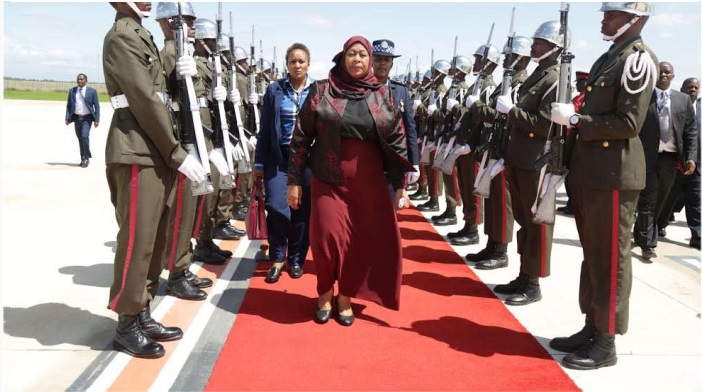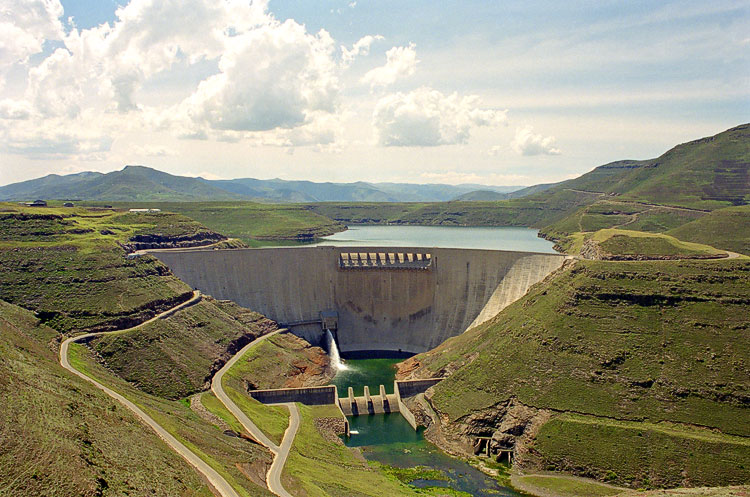
Tanzania Vice President Samia Suluhu Hassan inspects Guard of Honor in Mbabane Swaziland on Thursday, March 16, 2017.
By TZ Business News Staff.
Heads of State from six Southern African Development Community (SADC) nations meet in Mbabane, Swaziland on Friday, March 17, 2017 to discuss the volatile security situations in Lesotho and the Democratic Republic of Congo (DRC).
Tanzania currently holds chairmanship of the SADC security councils dubbed SADC Double Troika gatherings. The country will be represented at this meeting by the Vice President, Samia Suluhu Hassan on behalf of the Tanzania President, Dr. John Pombe Magufuli.
The meeting, which is part of the so-called Double Troika meetings will be attended by heads of State from Tanzania, Swaziland, South Africa, Angola, Botswana and Mozambique. It is a select group out of the 15-nation SADC development block picked to deal with the ‘double-troika’ problem.
A statement from the Vice President’s Office said Samia Suluhu Hassan arrived in Mbabane on Thursday, March 16, 2017 and was received by Swaziland’s Minister for Public Service, Owen Nxumalo. The Vice President inspected a guard of honor and was welcomed by colorful traditional African dance.
The high-level security meeting on March 17, 2017 has come amid persisting tensions in Lesotho and Congo DRC. The meeting has also come as recommended by a ministerial level SADC security meeting held in Dar es Salaam, Tanzania a few weeks earlier in February to discuss the volatile situations.
Ministers meeting in Dar es Salaam on February 24, 2017 recommended that a Heads of State meeting be called to discuss the situations in greater detail, the statement from the Vice President’s office said.
Lesotho is embroiled in factional disputes linked to corruption and bids to control a power generation dam and a tunnel to send water to South Africa which will bring money from the bigger neighbour in the form of loyalties for using the water resource from the tiny enclave nation. The political instability in the tiny mountain kingdom is linked to the multi-billion-rand Phase 2 of the Lesotho Highlands Water Project (LHWP), according to media reports.
Politicians are craving for power to control this project, according to media reports. The military got split into two parts as the politicians are, with the chief of defense forces refusing to be replaced by another army officer as ordered by the head of government. The outcome has become a tense atmosphere in the country of two million inhabitants.
The security situation is Congo DRC is worse, according to Human Rights Watch which has said in a report that the year 2017 will be critical for the Democratic Republic of Congo, where citizens want to change the presidency.
 After much bloodshed and two years of brutal political repression leading up to and following the December 19, 2016, deadline that marked the end of President Joseph Kabila’s constitutionally mandated two-term limit, participants at talks mediated by the Catholic Church signed a peace agreement on New Year’s Eve 2016.
After much bloodshed and two years of brutal political repression leading up to and following the December 19, 2016, deadline that marked the end of President Joseph Kabila’s constitutionally mandated two-term limit, participants at talks mediated by the Catholic Church signed a peace agreement on New Year’s Eve 2016.
The agreement includes a clear commitment that presidential elections will be held before the end of 2017, that President Joseph Kabila will not seek a third term, and that there will be no referendum nor changes to the constitution.
And while the deal could prove to be a big step toward Congo’s first democratic transition since independence, there’s still a long road ahead, according th Human Rights Watch.
Violence has intensified across the country in recent months, leaving several hundred dead, including in Tanganyika, North-Kivu, and the Kasai provinces, as well as in the capital, Kinshasa.




